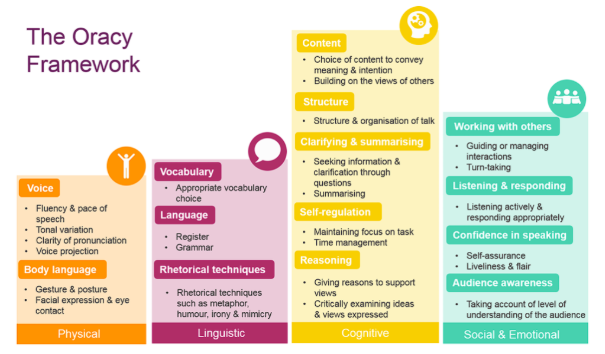Oracy
We believe that every child deserves a high-quality oracy education, as it is the key to developing the literacy skills that are needed to thrive in the modern world. Children should be taught explicitly how to express their thoughts, learn, collaborate, listen with understanding and empathy, engage critically with the world around them, seek clarification or further information, and advocate for their civic rights and the rights of others. They should have opportunities to celebrate the language(s) that they speak, develop confidence in communicating across different settings, registers, and genres, and learn how to build and maintain happy and healthy relationships.
Oracy Curriculum, Teaching and Assessment
Literacy is at the heart of our curriculum and every child has a right to be literate. Spoken language underpins the development of reading and writing and therefore our curriculum aims to build student’s confidence in both spoken language and listening skills. Confident communicators are not only successful in education, but also in social environments; they have higher self-esteem and can maintain strong relationships because they are able to express their feelings, articulate their beliefs and build healthy relationships.
Our curriculum, underpinned by the Voice 21 research and curriculum, explicitly teaches oracy skills; provides opportunities to practice those skills across all learning and creates a culture of pride and confidence where students can express themselves clearly to others. It is divided into the four strands that Voice 21 sets out:

The oracy curriculum has the following key strategies in line with the Voice 21 approach:
-
Talk-rich Environment: Creating a classroom culture that values speaking and listening, providing all students with the chance to participate.
-
Structured Dialogues: Equipping students with the skills to engage in structured discussions, debates, and presentations.
-
Peer Assessment: Encouraging students to provide constructive feedback to one another, creating a collaborative and supportive learning environment.
-
Curriculum Integration: Embedding oracy into various subjects to reinforce its importance and practical application.
-
Teacher Training: Preparing educators with the skills and confidence to facilitate oracy development effectively, especially for students facing socioeconomic challenges.
